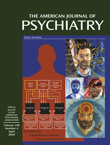Panic and Depression
To the Editor: Renée Goodwin, Ph.D., and Mark Olfson, M.D., suggested that detection and treatment of panic may reduce the risk of developing major depression in the community (1). A significantly smaller proportion (19%) of individuals who received treatment for panic than those who did not receive it (45%) developed major depression. Unfortunately, the authors’ broad definition of treatment (consultation with any professional, including priests and counselors) hinders a clinical translation of their findings.
There is now, however, evidence that supports the conclusions of Drs. Goodwin and Olfson. We refer to our 2- to 14-year (median=8) follow-up study of 132 patients who satisfied the DSM-IV criteria for panic disorder with agoraphobia, who became panic-free after 12 sessions of behavior therapy based on exposure homework (2). Only 8 patients (6%) developed a major depressive disorder during the follow-up period.
Even though a control group was not available for study participation, the finding was remarkable because of the liability of patients with panic disorder to develop depression (1). Vollrath and Angst (3) found that the occurrence of depression was the most likely outcome after 7 years for patients initially diagnosed as suffering from “pure panic.” Since cognitive behavior treatment of residual anxiety has been found to improve the outcome of depression (4, 5), it is conceivable that psychotherapy may decrease the vulnerability to depression of patients with panic disorder.
This is not necessarily true of the drug treatment of panic disorder. In our investigation (2), concurrent use of benzodiazepines and antidepressant drugs connoted a worse prognosis in terms of relapse into panic, confirming previous reports. In view of the potential sensitizing effects of antidepressant drugs (6), including emergence of depression during treatment of panic disorder, patients treated with these drugs may have a higher likelihood of developing depression than those treated with psychotherapy or placebo. Follow-up studies on this subject are of utmost importance.
1. Goodwin R, Olfson M: Treatment of panic attack and risk of major depressive disorder in the community. Am J Psychiatry 2001; 158:1146-1148Link, Google Scholar
2. Fava GA, Rafanelli C, Grandi S, Conti S, Ruini C, Mangelli L, Belluardo P: Long-term outcome of panic disorder with agoraphobia treated by exposure. Psychol Med 2001; 31:891-898Crossref, Medline, Google Scholar
3. Vollrath M, Angst J: Outcome of panic and depression in seven-year follow-up: results of the Zurich study. Acta Psychiatr Scand 1989; 80:591-596Crossref, Medline, Google Scholar
4. Fava GA, Rafanelli C, Grandi S, Conti S, Belluardo P: Prevention of recurrent depression with cognitive behavioral therapy: preliminary findings. Arch Gen Psychiatry 1998; 55:816-820Crossref, Medline, Google Scholar
5. Paykel ES, Scott J, Teasdale JD, Johnson AL, Garland A, Moore R, Jenaway A, Cornwall PL, Hayhurst H, Abbott R, Pope M: Prevention of relapse in residual depression by cognitive therapy. Arch Gen Psychiatry 1999; 56:829-835Crossref, Medline, Google Scholar
6. Fava GA: Potential sensitising effects of antidepressant drugs on depression. CNS Drugs 1999; 12:247-256Crossref, Google Scholar



